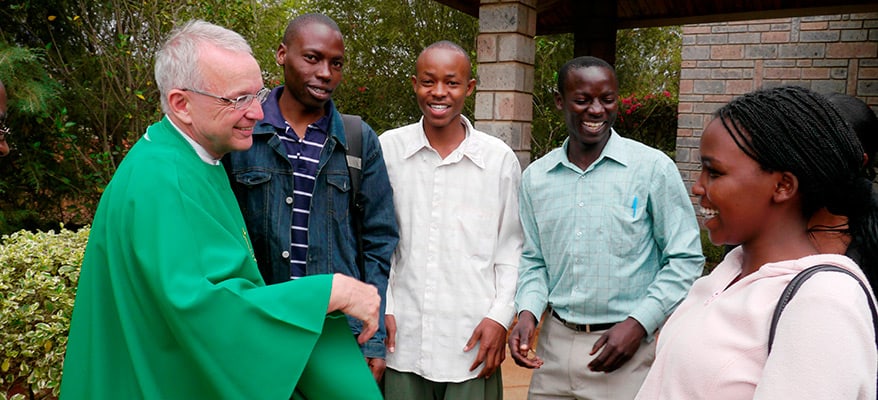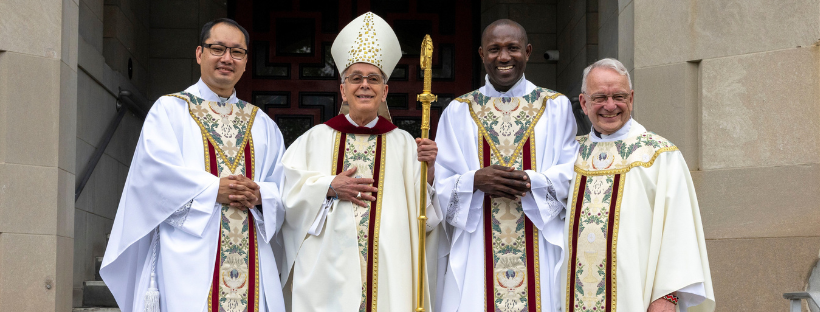Today’s Gospel from Saint Luke narrates the merciful action of Jesus in curing ten lepers. Certainly, to be healed of such a horrible affliction is a great gift, flowing from Jesus’ compassion. Surprisingly, only one returns to express his gratitude to Jesus. Thus, Jesus asks: “Ten were cleansed, were they not? Where are the other nine? Has none but this foreigner returned to give thanks to God?” And, as Saint Luke notes: “He was a Samaritan.”
Today’s Gospel presents the “grateful leper” (Lk 17:15-19). Recently on July 10, we heard Jesus’ parable of the “Good Samaritan” (Lk 10:29-37). During the Lenten liturgy on the Third Sunday of Year A, we hear about Jesus and the “Samaritan woman at the well” (Jn 4:1-42). To Jewish ears during the time of Jesus praising the virtues of Samaritans would be shocking. Yet, Jesus three times holds up foreign Samaritans as examples to be imitated.
Gratitude. This beautiful virtue, is not a single, one-time expression; Christians approach life, people, and events with a constant “attitude of gratitude.” Allow me to propose “ten commandments of gratitude.”
(1) Recognize your many blessings. Recall the copious gifts you have received: family, health, friends, faith, opportunities. Each moment and stage of life brings new blessings; we are gifted again and again.
(2) Reflect on the source of gifts. We do not earn gifts; God is the source of our richness. Treasure God’s generosity.
(3) Recall frequently: gifts are meant for sharing. All we are and all we have are gifts. Our person, our talents, our richness are meant for sharing, not hiding or hoarding. What you have received as a gift, give as a gift (Mt 10:8).
(4) Remember, remember, remember. Continuous remembering is central to making our past graced moments, small or large, present and alive in our lives.
(5) Be grateful in all seasons. Gratitude is not only a fair-weather virtue; prosperous times and difficult moments are equally opportunities to give thanks.
(6) Guard against the enemies of gratitude. Self-pity, jealousy, and resentment attack and drive out genuine gratitude. Be done with asking: Why me? Is life fair?
(7) Practice acts of gratitude daily. Express and manifest thankfulness regularly;
develop the habit of manifesting gratitude.
(8) Enrich your personality through gratitude. Grateful people are at peace with themselves, with others, and with what they have.
(9) Place gratitude at the center of your prayer. Prayer from the heart is replete with thankfulness. Grateful persons turn easily to God in prayer.
(10) Become a Eucharistic person. The Greek word, Eucharist, means thanksgiving. Sharing Christ’s love in the Eucharist can transform us into loving, grateful, serving persons, permeated with an “attitude of gratitude.”
Like the thankful leper, we are to constantly praise God for his gracious mercies. Like Jesus himself, we are to see sincere goodness in other people—even in those we did not expect. Do we have the eyes of Jesus—eyes of mercy?
James H. Kroeger, M.M.
Prayer for the 28th Sunday in Ordinary Time
Fill my soul each morning with your praises,
O Lord, for the gift of another day and may each evening
find my heart overflowing with gratitude
for all your graces and blessings in my life.
For the gift of life, health and love
I give you thanks, O Lord!
for family, friends and neighbors
I give you thanks, O Lord!
for each challenge, each setback,
each failure I give you thanks, O Lord!
for each breath, each step, each day
I give you thanks, O Lord!
Above all, for faith in your providence,
for hope in your promises and for love of your presence
in the Eucharist, In my heart, in my soul, in my life,
and in my world, I give you thanks, O God,
my Lord and my Savior.
Amen.
By Fr. Joseph Veneroso. M.M.



